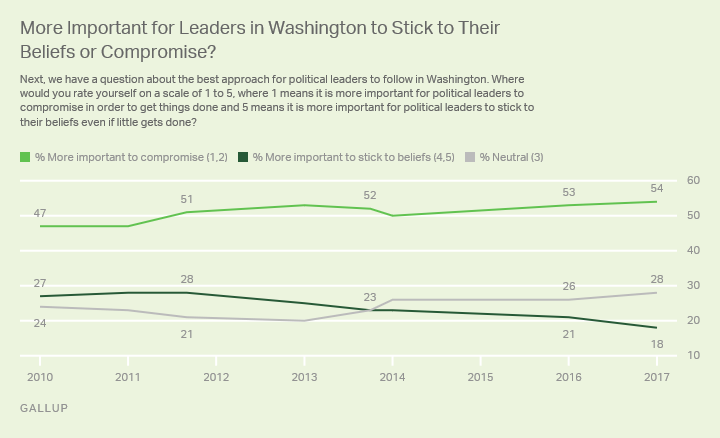Co-Operation
Nov. 5th, 2018 11:23 amI wrote this two years ago, but never posted it, due to the high emotions surrounding the Presidential election. Now, with John McCain dead and Lord Trump’s midterm popularity contest upon us, I think it’s a fair time to share.
For virtually my entire life, the political world has been divided between Republicans and Democrats.
 Americans favor compromise |
The Republicans see themselves as the champions of small government, low taxes, strong defense, and individual initiative. Their opponents are quick to point out the shortcomings of Republican policies, which include corporate rapacity, military adventurism, blind nationalism, and selfishness and greed that run counter to the common good.
The Democrats espouse high-minded ideals like fairness, compassion, equality, inclusivity, and a social safety net. However, their government handout programs are expensive, and their idealism can get in the way of real-world pragmatism.
Republicans accuse Democrats of diluting the Christian values of America, while the Democrats point out the hypocrisy of vocally Christian Republicans whose behavior is anything but charitable.
All this posturing obscures the values that we as Americans have in common: freedom, fairness, individualism, a strong economy, and an overall greatness that lends us a justifiable position of world leadership.
This year has brought to light fundamental challenges for the American two-party system. The Republican party has fractured into moderate and radical factions with no viable leadership and no apparent path to reconciliation. The Democratic party faces a similar split between centrists and socialists, although the two factions appear to be able to play together, at least for now.
This is all symptomatic of the fact that the two-party system no longer serves the best interest of Americans. For the first time in decades, the American people have abandoned traditional political parties and the mediocre candidates they typically nominate. The mainstream Republican candidates were all weak and easily toppled by an outspoken, brash, demagogue who gleefully spews the most un-American and shameful vitriol. While the Democrats could only offer us another untrustworthy business-as-usual chameleon.
Meanwhile, the Republican Congress is doing its damnedest to avoid its Constitutional duty to ratify a new Supreme Court justice. The radical faction is the tail that is wagging the Republican party, leaving the Republicans I know in a quandary. There is no longer any space in the Republican party for intelligent people who are fiscally conservative (low taxes and small government) but socially liberal (reproductive rights, LGBT rights, equality, immigration reform). Meanwhile, Democrats don’t exactly welcome members who are fiscally conservative. Where are those voters—and there are plenty of them—supposed to go?
Lost amidst all this shortsighted partisan tantrum-throwing is the old-fashioned notion of hearing one another out and finding mutually-acceptable legislative solutions. Political theory suggests that the majority party honor and address the concerns of the minority party, to produce a stronger piece of legislation that earns bilateral support.
In the past, this has worked well. Democratic social programs can only succeed with assertive watchdoggery. Corporate profit-seeking enhances our standard of living only if its excesses are regulated for the benefit of all. A huge military must be tempered with strong diplomacy and compassionate leadership.
Everyone acts as if the winner gets to mandate how the country is run, but it has always been—and always will be—a political process of communication, negotiation, and compromise. The wisest political solutions only come about when civil people with diverse views work together, which our current political parties have forgotten.
It amazes me that I need to point this out to my fellow Americans, but even radical views don’t need to lead to radical conflict. This is America, for chrissake! Our whole 240-year experiment in democracy is built upon a foundation of political tolerance and respect.
A high-minded but political realist named Lincoln, when asked why he didn’t call Confederate rebels his irreconcilable enemies, once replied, “Do I not destroy my enemies when I make them my friends?”